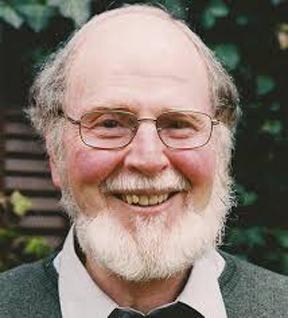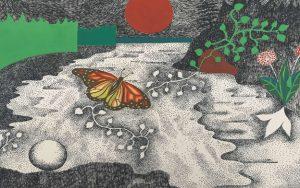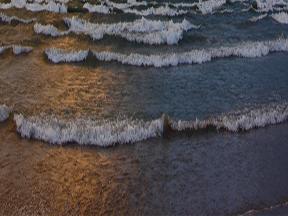Don Gutteridge

A Short Autobiographical Story
I was born in Sarnia General Hospital on September 30, 1937, and named (but never Christened) Donald George Gutteridge (my second name after my Uncle George McWatters). My Dad, who did not graduate grade 8 spelled it Gorge, later corrected by my mother (Margaret Grace McWatters), who graduated high school in Special Commercial. Days later moved to Point Edward, soon to take up residence upstairs in my Grandparents house at the corner of 208 Alexander (Alexandra) Avenue and Monck (Monk) Street.
In June of 1939 my maternal grandfather, John Leonard McWatters, who began living with us, was murdered in Sarnia. No one was ever charged.
In September of 1939 my Dad joined the air force (along with my Uncle Tom Gutteridge), and was soon stationed in Ottawa, where I moved with both parents. My brother Bob (Robert William), who was born that March, stayed home in the care of his grandparents. When my Dad was sent to a Labrador posting (later Iceland), my mother and I returned home in the Spring of 1940.
During the war years I led an idyllic life as a spoiled first child. I started school at the Edward Street School (now demolished) in September 1943. In October 1944 I contracted rheumatic fever and was hospitalized for a week. The high fever opened the valves of my heart. My mother put me in the care of her gynecologist, Dr. Christie, who ordered complete bed rest for seven months. I was a precocious reader and spent my bedridden hours reading whatever I could find. I never left the bed once until May of 1945. My Dad was given leave to visit me shortly after I came home from the hospital. My mother was my faithful nurse. I returned to school to finish grade two with the support of my wonderful teacher, Mrs. Young, who brought me homework to keep me up to date. I wrote my first story for Miss McDonald, my grade three teacher, (and a poem about it in God’s Geography). From that time on I found a group of fast friends in the village whom I have put into poems and novels. It was a great life (as the books show). I spent a lot of time in my grandfather’s workshop, and adored him. In July of 1945 my Dad came home after almost six years away. We had a difficult time bonding: he was a superb athlete, I wasn’t. My Dad got a job as a switchtender on the local CNR and we prospered enough for my Dad and Mom to build their own house on the Fourth Line of Sarnia. The move into the lonely countryside, away from my home village, was devastating for me. For two years my brother and I, every second week, walked to the train station and caught the bus to Point Edward, where we stayed with Gran and Gramps, and tried to keep up the fraying friendships that had been so much a part of my life.
Bob and I walked a mile and a quarter to S.S. #12, a one room country school, which I attended from Grade 6 to 8. Like most kids, I soon adjusted and found new fast friends, Bobby Cooper and Tommy Fahselt, both of whom I have written poems about. I became entranced by a grade 7 girl, Grace Leckie, who occasionally rode to school on a chestnut stallion. Miss Nelson encouraged me to keep on reading and suggested I write a Christmas play for the school. It was performed, with me as leading man (Santa, I think) in the township hall before an applauding audience. My novel, Winter’s Descent is a thinly disguised account of one of my years there. I also wrote my first poem that year, about Wolfe and Montcalm (in rhyming couplets).
I entered Grade 9 at Sarnia Collegiate Institute and Technical School in the Fall of 1950. There I was bullied and unhappy, failing a subject (math) for the first time in my life. In June of 1951 my Dad was transferred to Chatham (in an effort to save his marriage) and I spent the rest of that month with my grandparents and finished Grade 9. (My chief accomplishment that year was to write my first completed novel, Pass That Puck, typed out on an Underwood borrowed from my Aunty Betty). Once again I was devastated at having to leave the friends I had made and a life I had begun to enjoy. (I have written many poems about life on the Fourth Line and friends like Bonnie and Sharon Lauer, Marilyn Matheson and others.)
I spent a lonely summer in our new Chatham house at 28 Kerr Avenue in the subdivision of Orchard Heights. In the Fall I entered Chatham Collegiate Institute where, in the smaller academic school, I soon found friends with common interests, learned to play chess and handball and did well academically (third in the class). My high school years were the usual fraught story of girl-trouble and false steps, but overall happy enough years. I had two very close friends in the school and one bosom buddy who went to the Tech school, Alvin Gehl, who loved to test out the games I invented (an obsession that lasted well into my life). Alvin has been duly celebrated in several poems, and we remain friends in our old age. During these years I wrote part of a verse play on ancient Greece, an unfinished mystery story and a similarly unfinished novel about Dutch immigrants (who peopled CCI). I wrote only one poem, a lament about the failed Hungarian Revolution. I saw myself then as becoming a novelist. For the last three summers I spent in Chatham I worked in the yard office of the local CNR and saved my money for college. On the darker side, my beloved grandfather died after a prostate operation. I was devastated. It was the first of many such deaths I would suffer over the course of a long life.
In the Fall of 1956 I entered The University of Western Ontario (UWO), registered in Honours English. I did not do well in English (an indifferent lecturer) (a B) but enjoyed college life, surprising myself by having several dates and living with five other fellows upstairs in a home on the corner of Western and Sarnia Road (a plaza now), two of whom became good friends. I joined the Hesperian Club (for English lovers), heard Northop Frye speak to us and fell in love with my minor, History. I did little writing (except for a controversial essay I wrote for Folio, the school literary journal, “Let’s Destroy the Church.”
The next year was wonderful. I had Professor Ross Woodman for Romantics and fell in love with Keats and Shelley. I started to write longish poems in homage to them (several were published in Folio and fortunately have faded into obscurity.) I also loved History and Geography and made the Dean’s Honour List (after which, in following years, I made little effort to replicate). My partner and I came second in the university badminton champion-ship. Don Hair and I became good friends (and still are). Alas, my parents’ marriage was breaking up. My Dad moved my mother and brother to an apartment in London, promising to follow, and simply never did. My mother had to go to work to support Bob and me through the rest of our schooling. In the summer following second year, I had a chance to go north to Red Lake and work as a solutions man in the gold mine at Balmertown. I played softball for the mine’s team (third base and right field) and hit over 300. My Dad would have cheered, but for us it was too late. My Dad quit the CNR (just before being offered a super-intendent’s job), moved to Calgary, took up both taxidermy and the drink.
I lived with my mother for my third and fourth year at Western and was both lonely and unhappy, for her and for myself. My grades suffered and I barely made it out of fourth year. But with summer approaching in 1960, the happy thought of doing the teacher training term and getting a job and having a life, I started to write again, some poems and the beginnings of a novel (about life in Balmertown). I got a job offered to me teaching English to Grades 11, 12 and 13 at Elmira District High School in Elmira, Ontario. My real life was beginning.
I instantly fell in love with teaching. I had found one of the things I had wanted to do with my life. I also fell in love with the Home Economics teacher, Margaret Anne Barnett. Anne and I went on platonic excursions to Toronto (where she had gone to school and had connections) and soon were fully in love. I proposed on a snowy night in February 1961 in Anne’s new Volkswagon. We were married by a judge in Guelph and attended a small reception for us by school friends and my mother and brother. We rented the back half (servant’s quarters) of a big house (the old Drew homestead) and began our married life, driving each day from Elora to Elmira District High School. Many weekends we drove to Toronto for musicals and plays at the O’Keefe Centre. It was a wonderful winter and spring. Over 85% of my Grade 13 students passed their provincial English exam.
I had to attend the second half term of my teacher education the following summer, so we moved back to London and rented an apartment on Waterloo Street (now demolished). In mid-course I came down with a serious bout of appendicitis and had my appendix removed. A week later I was back in class, catching up and determined to finish the training. I passed with honours, and we returned to Elora for another year of teaching.
1962 was an uneventful year, marked by my decision to go back to Western for a Master’s degree. Since we had not had a honeymoon the summer before, we went to Europe for a nine-week excursion, visiting England, Scotland, Ireland, France, Germany, Austria and Italy. That Fall, we rented a lovely apartment on Grand Avenue, near Ridout, and I began my new degree, falling back on our savings and a fellowship that had me teaching English 20. I loved lecturing and could envision myself doing this for a living. I did well in my courses (As) but got stalled on my M.A. thesis, mostly because I had returned to my novel about life in Balmertown and didn’t know which project to focus on, with the prospect of a failed M.A. or a further term in the Fall of ‘63 (which we couldn’t afford). Moreover, Anne was expecting our first child in June of ’63. It was time to forget about writing (thesis or novel) and go to work to support my family. I got one teaching English and acting as department head in Ingersoll Collegiate. We moved to a new townhouse development on Oxford Street across from Oakridge High School and I commuted each weekday. William John Barnett Gutteridge arrived a month late (July 10) but hale and hearty. I was a father. At Ingersoll, once again I loved the teaching but crossed swords with an erratic principal. I decided I couldn’t stick it out (the snowy 50-minute commute and difficult superior) and applied for a job in London. I was lucky to be offered one at Beck Collegiate, one of the best schools in the City.
I stayed at Beck for two years as an ordinary English teacher (grades 9, 11, 12 and 13). My mother divorced my father. My brother was teaching elementary school in Point Edward. Sometime during those two years I finished my novel and sent it to Jack McClelland. He liked it but said the entire book had not one word of dialogue. I thought that if I were to become a novelist I had better learn to write dialogue. (I learned later in the decade by taking the advice of Alice Munro: that dialogue comes naturally from the creation of strong characters put in the same room.) Meanwhile I had had my first poem published in a real magazine: “This Maple in my Fallen Yard” in the Fiddlehead (1961 or 1962 and republished in The Village Within). Encouraged I started to write both short lyrics about Point Edward and several long poems about the Jesuits in Huronia, Champlain and LaSalle. In 1966 I moved to Westminster Secondary School as department head and Catherine Anne Gutteridge was born on June 10. I was having some success getting my poems published in the little magazines of the period (three narratives in The Fiddlehead). Again I enjoyed teaching and running a large department. Sometime in 1967 I read Strange Empire by John Kinsey Howard and got to work on a series of poems about Louis Riel, eventually finishing it as Riel: A Poem for Voices. I sent it off to Fred Cogswell at Fiddlehead and he agreed to publish 500 copies if I would subsidize the printing. Somehow, with a growing family and a new apartment in Inglewood Park, I squeezed out $200 and my first of more than 65 books was published in 1968. I was an author.
The Rest
1968 was a banner year. Riel was published and received two good reviews and Professor John Smallbridge went on sabbatical at the new Althouse College of Education and asked me to replace him. Earlier in that Spring we moved from Inglewood Park to a townhouse on Kipps Lane. I settled in to teaching English methods to English grads and travelling about southern Ontario following my students and supervising their classroom experience. I had found a work that I really loved. I was equally fortunate in that the next year the College expanded and I was taken on full time as an assistant professor in the English Department. That same year we moved to Victoria Street. Writing-wise I began to gather together poems I wrote about Point Edward, the first of what proved to be a lifelong obsession, and Fiddlehead Poetry Books published the collection as The Village Within: Poems Toward a Biography. (I will not comment on all of my books in this document, except when there is a story behind the telling. (A complete bibliography is available on my Wikipedia site.) My interest in historical figures continued with Death At Quebec and Other Poems (Fiddlehead 1972) (I won the UWO President’s medal for title poem).
In January 1972 my mother died suddenly and I wrote a poem for her: Saying Grace: An Elegy (Fiddlehead 1972). But earlier in the summer of 1970 I found myself free of teaching and able to take on a major writing project. I sat in the shade of my back yard and wrote, in six or seven weeks, the first draft of a comic novel, Bus-Ride, published in 1974 (Nairn Publishing) and well reviewed. I have no idea where the germ for this book came from, nor had I ever seen myself as a comic writer. But I had mastered dialogue (one of the book’s strengths)!
Shortly after I began to search about for historical topics for future poems. I discovered and devoured Samuel Hearnes’s Journal and wrote a book-length poem on him (Coppermine 1973), which turned out to be a finalist for that year’s Governor Generals Literary Awards. Encouraged, I wrote two more book-length historical poems, Borderlands and Tecumseh, all published, like the first, by Oberon, the most successful small literary publisher in Canada at that time. I felt I had arrived as a poet (and a minor novelist). I continued to enjoy teaching at Althouse, which became a Faculty of Education at Western and was promoted to associate professor. I continued to publish papers on educational theory and practice in English throughout my twenty-five-year career (40 articles on both pedagogy and literary criticism: details are available in my Wikipedia entry..)
Family life continued apace. Anne and I took Kate and John on a number of camping trips, visited Canadian battlefields and Fort Henry. I was ready, author-wise, for a change of direction. I had written out my interests in aboriginal figures and started to look back to The Village Within for inspiration. Within a year I had produced A True History of Lambton County (Oberon, 1977) in which I used passages of “found” material from the historical record and interweaved them with the poetry. Again the reviews were good and I had found a subject I thought I could explore deeply. I was not prepared for the several years of writer’s block which followed. Desperate to continue writing poetry, I conceived a project eventually published as God’s Geography (Brick Books 1982). In it I incorporated excerpts from The Sarnia Observer, original and vintage photos, and excerpts from interviews with local residents taped by my Uncle Bob. For poetry, I dredged up parts of The Village Within and wrote a few new pieces. It turned out to be not only the mélange of a desperate poet but my best reviewed book of poetry up to that time.
In 1978 I wrote the first of my ten “academic” books and began teaching graduate courses in English pedagogy. Then I surprised myself with another comic novel, All in Good Time (Black Moss Press 1982). Then followed the driest period in my writing career. I joined The League of Canadian Poets, served on the executive, did public readings across the country, but wrote no poetry. I was dry.
Sometime in 1984 or early 1985 the germ of a new novel arrived. If I could no longer be a poet perhaps I could be a novelist. I wanted to write an historical novel (that abiding interest) from a woman’s point of view and Lily’s Story was born and pursued for two years (one of them a sabbatical). I decided to publish it myself in two volumes, St. Vitus Dance and Shaman’s Ground (1986 and 1988). The books are set in Lambton County and Point Edward, continuing my interest in local history. (In 2014 Bev Editions published the two volumes as Lily’s Story) Novel writing continued with another historical novel, How the World Began: A Parable of 1812 (Moonstone 1991.) The highlight of 1985 was the birth of my first grandson, followed a few years later by the birth of three more grandsons and even later by two granddaughters and since then they have been the highlight of my life. Tom lived with us for six years until Kate married, and when he was old enough we travelled with him widely, and he has inspired a number of poems over the years
In 1991 Oberon published a slim volume of verse, Love in the Wintertime. But again I turned to fiction as my main focus. And returned to my home village. Out came two memoir novels, Summer’s Idyll and Winter’s Descent (1993 and 1996) In between them I wrote a children’s/young adult novel, The Perilous Journey of Gavin the Great (not published until 2011 by Borealis). I published one other book of poetry in this period. But I was also coming to the end of a long academic career. I retired in October 1993.
Bored with retirement, I started in on what became a twelve-volume mystery series, The Marc Edwards Mysteries, with four publishers over a twelve-year period (2003-2015). These would be the last prose I would write. But I started writing poems again. The principal focus in these numerous volumes (12 titles over 20 years and three more to come) was Point Edward with many occasional poems added, on family life, the process of writing itself and aspects of my aging. My style also evolved. I began writing short poems that gradually were subsumed by internal rhyme, assonance, consonance and alliteration, unlike the more free flowing lyrics of the earlier period with “natural” line breaks. I continue to write these somewhat old-fashioned poems.
It’s been a full life and I’m still writing.
Books By Don Gutteridge

All in Good Time
All in Good Time is an authentic story of camaraderie, rivalry and national pride. Don Gutteridge is a story teller through and through. His skill at spinning yarn is seen all the way through this novel All in Good Time. This Novel is well worth this second life published by HBP.

Home Ground
Don Gutteridge has a divine gift; he crafts visions with an elegant ease, splashing colors on canvas of the mind’s eye. Home Ground recreates the past so vividly it argues for the concept of time standing still.

In The Rarefied Regions of the Heart: Last Lines
Don Gutteridge was wrong when he added the “Last Lines” to the title of this collection. After decades of being a prolific writer with over 70 titles to his name this was not to be his last collection of poetry. This is 106 pages of excellent well-crafted poetry.

inking the world
Another wonderful poetry collection by Don Gutteridge that will settle you in for a long read. It is just one of his 70 plus books. Trust the numbers and buy the book. You won’t be disappointed.

Inundations
Inundations looks back at the past – childhood and growing up – with wry humour and an ironic eye. Gutteridge’s poems pack an emotional punch.

Lilacs in Lavender Light
Lilacs in Lavender Light, is filled with lush, light-brushed imagery caught in the perfect prism of the poet’s memory and his profound recollections of what others might let fade. This collection will waken your memories.

